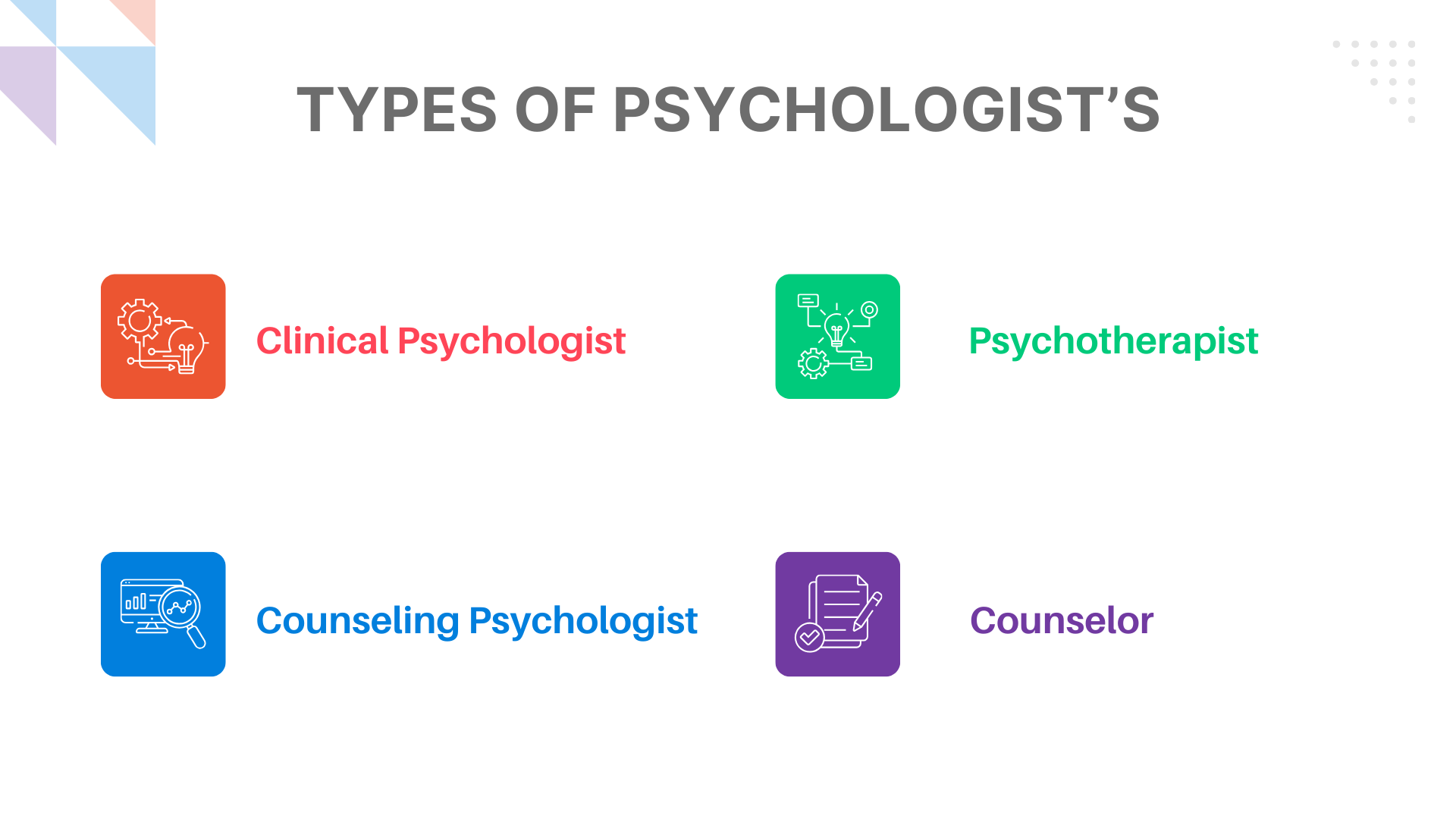4 Different Types of Mental Health Psychologist in India

While more and more people are gravitating towards seeking therapy in India, the process of finding a psychologist can be overwhelming and confusing. Due to a general lack of awareness, we may not know what to expect and how to identify a good psychologist for us.
Further, the lack of regulation in the field has led to a rise of unqualified, pseudo-practitioners exploiting people under the guise of offering therapy, support, and “healing” services. It is important to have a basic understanding of the existing mental health infrastructure in India so that we can make better, informed choices as service users for our mental health-related needs.
Essential Qualifications For a Healthcare Provider in India
The field of mental health is largely unregulated in India as currently there is no standard licensure body in the field of psychology (like the American Psychological Association in the United States).
A person who has completed a graduate and a postgraduate degree in psychology from a university recognized by the University Grants Commission (UGC) is qualified to practice as a psychologist.
However, there are no clear criteria about who can offer therapy services, except for who can practice as a clinical psychologist. This lack of structure and regulation often reduces the accessibility of mental health services and increases the chances of user harm and exploitation.
All psychologists do not offer therapy services. At the minimum, a mental health care provider must have completed a Master's in Psychology, preferably majoring in clinical or counseling psychology.
It is highly desirable that the professional keeps pursuing continuing education opportunities in the form of courses, workshops, seminars, research, etc. to keep up with the latest developments in the field of psychotherapy.
What are Different Types of Psychologists?
The Mental Healthcare Providers in India practice under various titles. Let’s unpack some of the common ones you may come across in your search for a therapist:
1.Clinical Psychologist:
To practice as a clinical psychologist in India, a person must have a Rehabilitation Council of India (RCI) license. In India, only clinical psychologists can give a clinical diagnosis, authorize psychometric testing, and work in clinical settings (e.g., hospitals).
2.Counseling Psychologist:
The counseling psychologist must have completed a Masters in Clinical or Counseling Psychology. They work with a myriad of psychosocial problems like interpersonal conflicts, work and life-related stress, self-discovery, etc. Counseling psychologists work in multiple settings like private practice, schools, corporations, wellness clinics, etc.
3.Psychotherapist:
Some psychologists in India work under the title of psychotherapist. While the terms counseling and psychotherapy are often used interchangeably, counseling is usually goal-focused, whereas psychotherapy is more reflective and long–term work focused on building a client-therapist relationship where the former can gain insights and increase capacity for self-reflection.
Psychotherapy is best suited for people interested in a dynamic, open-ended exploration of self beyond defined goals. Usually, a psychotherapist has a clear work philosophy (e.g., psychoanalytical, existential, relational, etc.) which they use as a reference point to anchor their work.
4.Counselor:
Some psychologists work under the title of a counselor. They usually work in a well-defined niche with specific types of concerns (e.g., career counselor, adoption counselor, etc.) It is important to distinguish Mental Health Counselors from front-end executives who call themselves a counselor (e.g., a self-titled ‘career counselor’ who recruits potential students for a course). Know the difference between Therapist and Counselor

Difference Between Psychologist and Psychiatrist?
Usually, a holistic mental health treatment involves a combination of mind–body interventions. Psychiatric medications offer an important line of treatment for mental health disorders. Especially for mental health concerns that cause a significant decline in daily functioning for long periods of time, a combination of psychotherapy and psychiatric medications works best.
It is important to note that only a psychiatrist can prescribe medications. To practice as a psychiatrist in India, a practitioner must have completed their MBBS and MD in psychiatry.
While a psychiatrist may offer some counsel related to the client’s symptoms, they are not trained for psychotherapy. Conversely, psychologists offer counselling and psychotherapy but aren’t qualified to prescribe medications. It is ideal if all parties work collaboratively for the client’s well-being.
Know in detail the difference between a psychiatrist and a psychologist.
Important Considerations in Selecting a Right Mental Health in India
Apart from educational qualifications, some important considerations in selecting a therapist are:
- Mode of practice (online, offline, or hybrid)
- Professional fee
- Theoretical orientation
- What measures do they take to ensure professional and ethical standards of providing mental health services?
- Do they have experience and training in working with people who have similar concerns to you?
- Do they have a therapist?
- Do they engage in continuing education, case consultations, and/or some form of clinical supervision?
- Do you feel comfortable sharing your experiences with them?
At Mave Health, we recognize that finding the right mental health professional who meets your needs has been a difficult challenge for most people. We are building India’s largest mental health platform so that you can find a professional that matches your preferences. Good mental health shouldn't wait, and we are eager for you to be part of our journey.
consultation
 Book Consultation
Book Consultationconsultation
 Book Consultation
Book Consultation